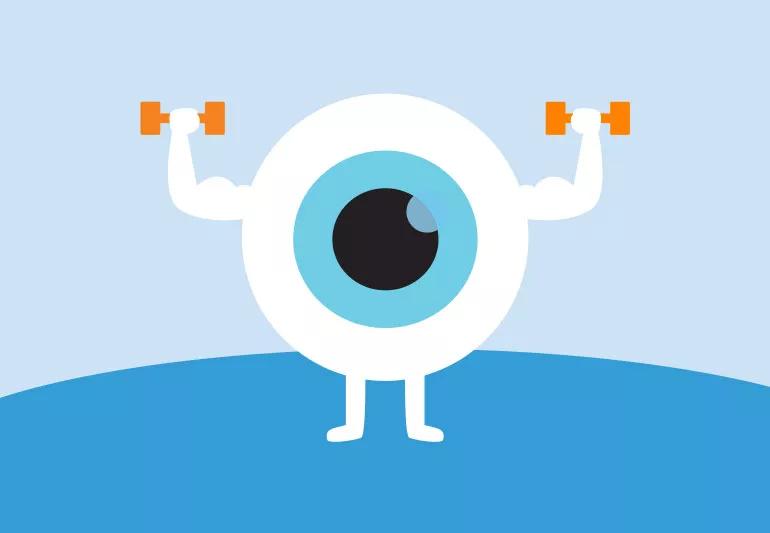Your eyes can reveal many clues about underlying health issues

Image content: This image is available to view online.
View image online (https://assets.clevelandclinic.org/transform/b2e0fc09-dba4-4851-9f1f-4cbfae28e047/healthyEyes-938352892-770x533-1_jpg)
eyes are a window to health
William Shakespeare said the eyes are the windows to the soul, but your next trip to the ophthalmologist could reveal a lot about your overall health as well. Ophthalmologists often see clues in the eyes that warn of health issues elsewhere in your body.
Advertisement
Cleveland Clinic is a non-profit academic medical center. Advertising on our site helps support our mission. We do not endorse non-Cleveland Clinic products or services. Policy
Ophthalmologist Rishi P. Singh, MD, says diseases and other issues may show up when you have your eyes checked.
“Any ophthalmologist who does routine eye exams can detect these problems,” says Dr. Singh. “Eye exams are important not only for the health of the eye, but also to determine if there are issues affecting multiple organs or the entire body that need attention,” he says.
Dr. Singh says many times, you may have slight visual issues that cause you to seek out an eye exam initially. But the exam can reveal your vision issue is related to — or perhaps even being caused by — a bigger health problem. Additionally, you might be completely asymptomatic and not even know you have an underlying health issue, but an ophthalmologist can take one look into your eyes and see another story.
Here are some health warning signs ophthalmologists can find in your eyes:
Dr. Singh looks for a condition called diabetic retinopathy, which damages the blood vessels in the eye. “We can see areas of bleeding and swelling in the retina, or abnormal blood vessels developing, which are hallmarks of diabetic damage,” he says. This damage can be observed even before vision is affected.
When diabetic retinopathy is detected, you’ll typically have laser treatments and medications to repair blood vessels. However, you may need surgery if the bleeding is severe enough.
Advertisement
High blood pressure can cause permanent damage to your vision by affecting the blood flow within the eye. Such damage can be the first clue that a patient is suffering from hypertension.
“A lot of the small vascular changes that occur when you have diabetes or high blood pressure don’t affect your vision until very late in the disease when you start to develop vision problems,” Dr. Singh says. “That’s why screening is so key,” he adds.
Even more serious, Dr. Singh says a routine vision screen could save your life. “We’ve seen strokes in the eye that are associated with carotid artery disease, which demand serious attention as they may be a future predictor of a cerebral stroke,” Dr. Singh says.
These include inflammatory bowel disease, Crohn’s disease, ulcerative colitis, multiple sclerosis and lupus. “There’s a well-known connection between inflammatory diseases and inflammation in the eye,” says Dr. Singh.
“We can pick up things like diabetes and high blood pressure in an eye exam, but changes in the retinal nerve fiber layer over time is a good way to monitor multiple sclerosis,” says Dr. Singh.
Most commonly, inflammatory diseases cause uveitis, which is an inflammation of the middle part of your eye (called the uvea). Untreated, uveitis can cause permanent damage to your eyes.
“Cancers by themselves rarely have manifestations in the eye,” Dr. Singh says. “However, there are certain cancers that can spread to the eyes,” he adds.
Melanoma is one cancer that is primary to your eyes, but can also show up elsewhere on your body. Breast cancer is an example of a cancer that can spread to your eyes, where it could be found before other tests show the cancer has spread.
Taking the time for a yearly eye exam not only protects your eyes, but it can safeguard your overall health.
The American Academy of Ophthalmology recommends the following screening guidelines:
Advertisement

Sign up for our Health Essentials emails for expert guidance on nutrition, fitness, sleep, skin care and more.
Learn more about our editorial process.
Advertisement
Focus on these surprising stats
More reasons to get regular eye exams
Plan on an annual vision screening, but a full exam may not be necessary
Caring for eyes at an early age
Most recommended precautions center around minimizing bruising or swelling
Even one drink can have an impact on your cognitive function leading to slurred speech, blurred vision and impaired memory
Type 2 diabetes isn’t inevitable with these dietary changes
Applying a hot or cold compress can help with pain
Pump up your iron intake with foods like tuna, tofu and turkey